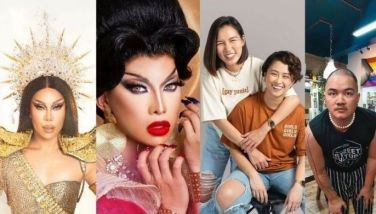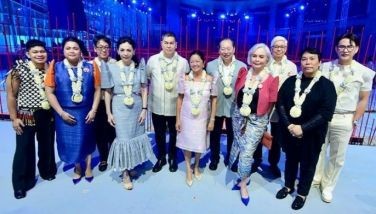First Phl Media Safety Summit

On World Press Freedom day this year, a most important event happened – the first ever Philippine Media Safety Summit, held from May 2 to 3 in Quezon City.
I was sad to miss this milestone gathering of journalists and press freedom advocates – young and old, retired and active, safe or not – from Mindanao, the Visayas, Luzon and Metro Manila because I was in the US at the time. But I am thankful it happened, especially in these extremely challenging times.
Allow me to share excerpts from the Philippine Media Safety Summit Declaration: A Call for the Protection and Safety of Journalists in the Philippines that came out of the two-day event:
We affirm that:
A democratic society is best served by independent and critical media that can help citizens make sense of events happening around them and become critical thinkers. Better journalism, alongside more responsive and democratic political and social institutions, builds a better society.
Journalists perform their jobs effectively under conditions of freedom or the observance of free expression, trust in journalism, economic sustainability, diversity, gender equality and inclusivity.
Freedom of the press and freedom of expression in the Philippines are fundamental rights and constitutionally guaranteed.
We likewise condemn:
The continuing killings of journalists and the lack of resolution of cases; and
The deliberate targeting of journalists and media organizations.
We also reaffirm:
The Philippine Plan of Action on the Safety of Journalists (PPASJ) that promotes the safety and protection of journalists and provides a multi-stakeholder framework and platform to coordinate efforts to:
Strengthen journalists’ professional competencies to increase the public’s trust in media;
Improve working conditions in media;
Strengthen legal and social structures and mechanisms to deal with various forms of harassment, threats and attacks on journalists;
Counter impunity by helping multi-stakeholder efforts to strengthen the courts and the methods of criminal investigation and prosecution; and
Increase public awareness and knowledge about the role of media in society through public information, citizen-media engagement and research.
* * *
The PPASJ has provided guidelines in support of the above five flagship goals. However, there is a need for these goals to be fleshed out by journalists and media organizations, academic institutions, human rights advocates and other sectors.
Due to space constraints, I will put the spotlight on these points:
That the government should perform its constitutional mandate and duty to stop the killings and all forms of violence against citizens, including mainstream and campus journalists and media workers, and to properly investigate crimes committed against them, including “red-tagging,” trolling and other forms of online hate and violence.
That media owners should recognize the rights of journalists and staff to form associations and unions; provide fair and decent living wages and an inclusive and gender-fair environment and safe workplaces, allowing journalists and staff to work without external pressure. While these workplaces are adapted to the latest technology, such as AI, their business models should not allow the deskilling, marginalization and displacement of journalists.
That newsrooms and media organizations should provide the necessary skills, materials, training and other resources to journalists, especially those going to hostile coverages, to ensure their safety and protection in the line of duty.
That journalists and media organizations should perform their work to the highest standards of their craft and provide to the best of their ability balanced and accurate reportage of events. They should hold themselves accountable for whatever they release to the public and encourage feedback and corrections of their lapses.
That media organizations should explore diverse business models, various revenue streams, narrative techniques for local stories and financial strategies including training services, monetizing the content, images and archives, without sacrificing ethics, truthfulness and other journalistic values.
Changing paradigms
It took a village to make the summit a reality and that village comprised a group of indefatigable, passionate and hardworking journalists and media workers: Jes Aznar and Jhoanna Ballaran of FOCAP; Len Manriquez and Charley Sta Maria of Pecojon; Red Batario of CCJD, Ariel Cervantes and Joyce Pañares of PPI, Weng Paraan of PCIJ; Therese Torres and Ann Lopez of AIJC, Dr. Diosa Labiste of UP-CMC and Len Olea of NUJP.
In all, they recognized that the Philippine media continue to feel the impact of disinformation, trolling and other forms of digital threats and attacks.
These challenges were the driving force behind the summit. The country remains one of the most dangerous places for media practitioners, with 117 journalists killed since 1996, according to UNESCO.
Jes and I would often spend many nights and days at home just talking about the many challenges besetting Philippine media and we both agree that beyond physical safety, media organizations must also ensure the welfare of journalists by providing the necessary tools that would enable members of the press to continue doing good journalism which, in turn, would translate to more readers. This is how foreign publications do it and it’s how they managed to survive the changing times.
A summit is only the first step in the media’s continuing journey to strive for a freer and more informed society but it is a big and bold step. A nationwide roadshow will follow to build a culture of media safety in the country and to institutionalize the summit’s plan of action.
I salute the convenors for organizing such an important event. It’s good to see journalists come together, especially in these dizzying times when purveyors deliberately bury the truth in false narratives and fake news.
* * *
Follow her on X, formerly Twitter @eyesgonzales. Column archives at EyesWideOpen (Iris Gonzales) on Facebook.
- Latest
- Trending


























